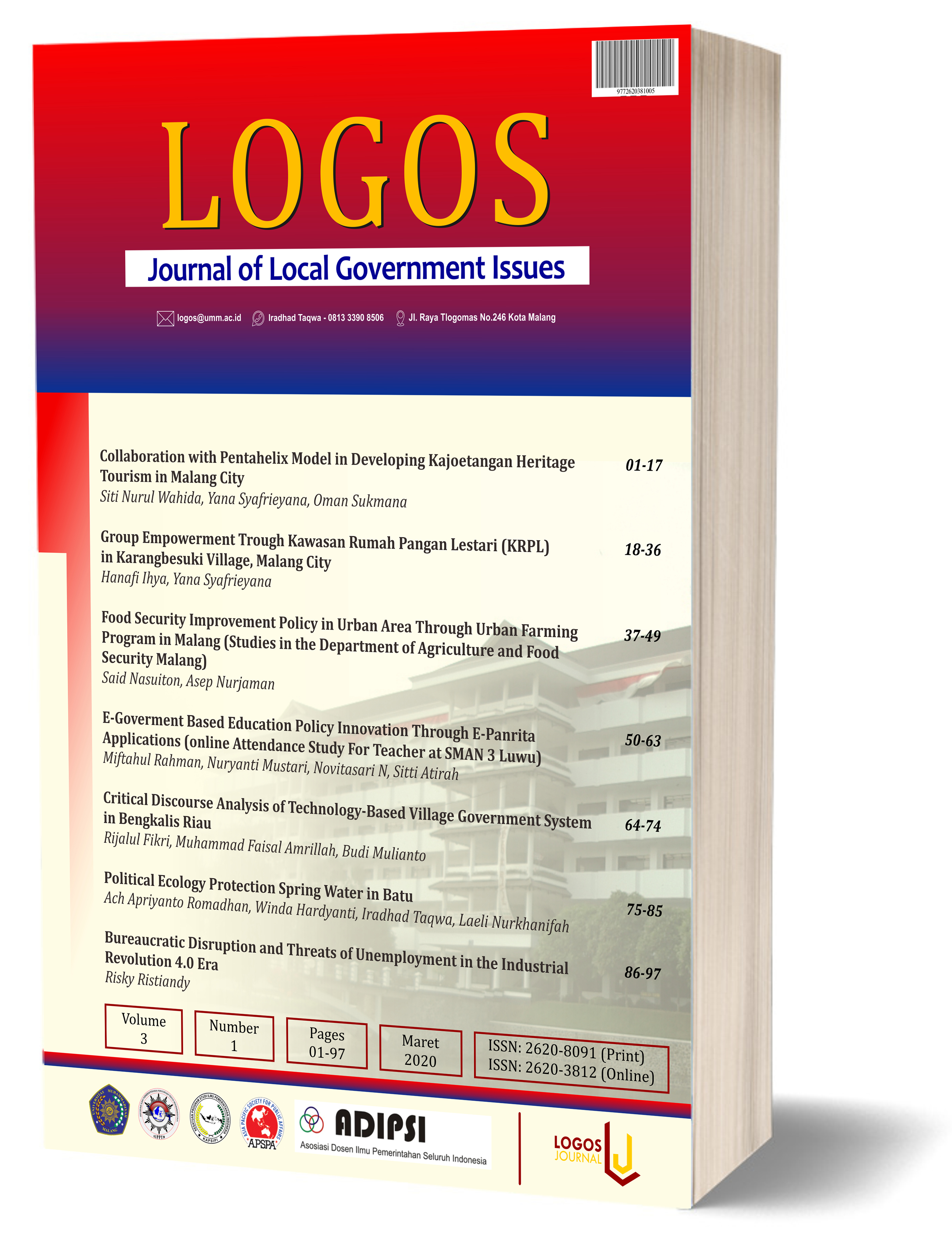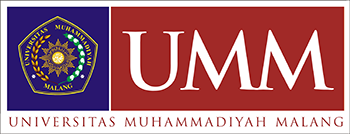Critical Discourse Analysis of Technology-Based Village Government System in Bengkalis Riau
DOI:
https://doi.org/10.22219/logos.v3i1.10929Keywords:
electronic-based government system, information technology, village governmentAbstract
This study aims to comprehend on how the discourse of e-government system in villages of Bengkalis Regency, Riau Province, by using the method of Foucauldian discourse analysis. Thus, discourse of this paper is the implementation of e-governance system forming the relation between power and society through the process of definition, isolation and justification. In the e-government system’s operation in Bengkalis, there are two remarkable interpretation as follows: firstly, for villages that adopted the e-government system, those involve in the interpretation of dominant discourse which define and justify the discourse of e-government system; and secondly, for villages that have still been in loyal of the local wisdom – “committing to the government system and society life order based on traditional, well known as self-governing community” -, those include in the interpretation of the marginalized discourse that means in the wider discursive context it is the discursive implementation of e-government system. As a logical conclusion, the existing discourse has expressed the state power represented by the effort of e-government system’s employment in which there are the major interpretation of village government categorized in the dominant discourse and the marginalized discourse.
Downloads
References
Bromley, Daniel W. 1989. Economic Interest and Institutions, the Conceptual Foundation of Public Policy. New York: Basil Blackwell. Andoyo, A. &, & Sujarwadi, A. 2014. Sistem Informasi Berbasis Web Pada Desa Tresnomaju Kecamatan Negerikaton Kabupaten Pesawaran. Technology Acceptance Model. Asgarkhani, M. 2005. The Effectiveness of e-Service in Local Government : A Case Study. The Electronic Journal of E-Government. Bhattacharyya, R. 2008. E-governance in rural West Bengal (India): Impact and implications. Electronic Government. https://doi.org/10.1504/EG.2008.019524 Eriyanto. 2001. Analisis Wacana: Pengantar Analisis Teks Media. Yogyakarta: LkiS. Hartono, Utomo, D., & Mulyanto, E. 2010. Electronic Government Pemberdayaan Pemerintahan Dan Potensi Desa Berbasis Web. Jurnal Teknologi Informasi. Limbeng, J. 2011. Suku Akit Di Pulau Rupat. Jakarta: Perpusnas. Retrieved from repositori.kemdikbud.go.id/7746. Mughis, A. 2013. Teori Kekuasaan Michel Foucault: Tantangan Bagi Sosiologi Politik. Masyarakat: Jurnal Sosiolog. Noviyanto. 2014. Implementasi sikades (sistem informasi kependudukan desa) untuk kemudahan layanan administrasi desa berbasis web mobile. Jurnal Informatika (Yogyakarta). https://doi.org/10.26555/jifo.v8i1.a2084 Raihan, A. H., Dr.Muh.Jamal Amin, M. S., & Melati Dama, S.Sos., M. S. 2017. Efektivitas Kebijakan Penerapan Aplikasi Sistem Informasi Desa dan Kelurahan. Ilmu Pemerintahan
Downloads
Published
How to Cite
Issue
Section
License
Copyright (c) 2020 Rijalul Fikri, Muhammad Faisal Amrilla, Budi Mulianto

This work is licensed under a Creative Commons Attribution-ShareAlike 4.0 International License.
Authors who publish with this journal agree to the following terms:
- Authors retain copyright and grant the journal right of first publication with the work simultaneously licensed under a Creative Commons Attribution-ShareAlike 4.0 International License. that allows others to share the work with an acknowledgment of the work's authorship and initial publication in this journal.
- Authors are able to enter into separate, additional contractual arrangements for the non-exclusive distribution of the journal's published version of the work (e.g., post it to an institutional repository or publish it in a book), with an acknowledgment of its initial publication in this journal.
- Authors are permitted and encouraged to post their work online (e.g., in institutional repositories or on their website) prior to and during the submission process, as it can lead to productive exchanges, as well as earlier and greater citation of published work (See The Effect of Open Access).

This work is licensed under a Creative Commons Attribution-ShareAlike 4.0 International License.













